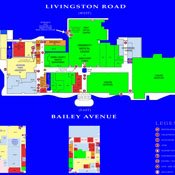Last year's skyrocketing gas prices, combined with the housing bust, unemployment and a general economic malaise, is enough to make many suburbanites rethink their commutes and McMansions in favor of a return to an urban, mixed-use environment. The Jackson Free Press has been advocating such a shift since we launched in 2002: Buy local, live green, recycle (buildings and more), and do good in the community are just a few of the memes we've repeated over and over.
Big,malls (covered or not) and big-box retail doesn't fit that paradigm well. With the entire country in dire economic straits, consumers are abandoning older malls for new "lifestyle" centers closer to home. About 10 percent of America's enclosed malls are bankrupt, according to The Wall Street Journal, and city malls like Metrocenter got hit with white flight to the suburbs. The Jackson metro is wildly "over-retailed," according to experts. Retailers follow where the money goes, and in Jackson, it has left Metrocenter's neighborhood.
The city, under former Mayor Frank Melton, virtually abandoned that neighborhoodthe Highway 80 corridor. Now, Mayor Harvey Johnson Jr. is slowly making inroads toward cleaning up and revitalizing what was once a thriving community. This week the Jackson City Council approved the purchase of 170,000 square feet of abandoned space at Metrocenter
Unlike other cities, Jackson has a phenomenal role model for revitalizing "dead" malls: the Jackson Medical Mall. It was the largest enclosed mall within 400 miles when it opened in 1969, but by 1995, it was an empty shell, eclipsed first by Metrocenter in '78 and then Northpark in '85. In 1995, Dr. Aaron Shirley, with a vision of establishing a space to aid Mississippi's poor, and with the help of bond issues from the Jackson Redevelopment Authority, Hinds County and the City of Jackson, created the Jackson Medical Mall.
The Medical Mall is the only facility of its kind in the nation. The space is stuffed full of government and university health agencies and schools, private clinics, a medical supply store and a credit union. Tenants include non-profit agencies providing services for expectant mothers, youth programs, tutoring, help with substance abuse, education and mental-health advocacy, plus a handful of minority and woman-owned food vendors and retailers.
While it may sound like we're advocating replicating the Medical Mall at Metrocenter, we're not. What we're seeing, though, is the city recognizing that the boom times of the '90s and early 2000s is over. Jackson needs a new way of thinking about revitalization, and we applaud Mayor Johnson and the council for taking a step outside of the mall box.



Comments
Use the comment form below to begin a discussion about this content.
comments powered by Disqus